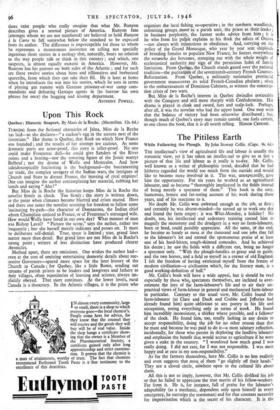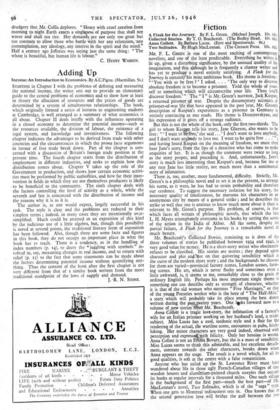The Pitiless Earth
While Following the Plough. By John Stewajt Collis. (Cape. 9s. 6c1.1
THE intellectual's view of agricultural life and labour is usually the romantic view, yet it has taken an intellectual to give us at last a picture of that life and labour as it really is to-day. Mr. Collis, well known as a writer of philosophic trend, decided that he had hitherto regarded the world too much from the outside and would like to become snore involved in it. The war, unexpectedly, gave him the opportunity. For six years he worked as an agricultural labourer, and so became " thoroughly implicated in the fields instead of being merely a spectator of them." This book is the easy, humorous, honest and far-seeing account of his work during those years, and of his reactions to it.
No doubt Mr. Collis was awkward enough at the job, at first ; and certainly he was absent-minded—he turned up to work one day and found the farm empty : it was Whit-Monday, a holiday! No doubt, too, his intellectual and sedentary training caused him to magnify the monotony and the drudgery in a way no farm-labourer, born or bred, could pc:sibly appreciate. All the same, its the end, he became as handy as most at the thousand and one jobs that fall to the labourer's lot and earned the spontaneous praise of at least one of his hard-bitten, tough-skinned comrades. And he achieved his desire ; he saw the fields with a different eye, being no longer a spectator only. " With the plough-handles to grasp and to guide, and the two horses, and a field to myself in a corner of old England. I felt the freedom of having extricated myself from the fetters of modern civilisation—a civilisation which, for the literary man, is a good working-definition of hell."
Mr. Collis's book will have a wide appeal, but it should be read especially by those who, spectators themselves, are inclined to over- estimate the joys of the farm-labourer's life and to air their un- practical views of farm-labour in general and mechanised farm-labour in particular. Contrary to the usual view, Mr. Collis found the farm-labourer (as Clare and Duck and Crabbe and Jefferies had already found him) quite oblivious to any poetry in his life and occupation, seeing everything only in terms of work. He found him incredibly inconsistent, a shirker where possible, and a follower of the clock. He found him, too, totally lacking in any desire to accept responsibility, doing the job for no other reason than that he must and because he was paid to do it—a most salutary reflection, incidentally, for those who persist in deploring the landless labourer and emphasise the benefit that would accrue to agriculture if he were given a stake in the country. " I wondered how much good I was really doing. I did not care, for I was not responsible. I was most happy and at ease in my non-responsibility."
As for the farmers themselves, here Mr. Collis is no less realistic and even suggests that most of them " go slightly off their heads." They are a closed circle, nowhere open to the cultural life about thesis.
All this is not to imply, however, that Mr. Collis disliked his job or that he failed to appreciate the true merits of his fellow-workers. Far from it. He is, for instance, full of praise for the labourer's adaptability (as a mechanic, dependent only upon himself in every emergency, he outstrips the townsman) and for that constant necessity for improvisation which is the secret of his character. It is the
drudgery that Mr. Collis deplores. " Hoary with cruel taxation from morning to night _Earth exacts a singlypess of purpose that shall not waver and shall not tire. Her demands are not only too great but too constant to allow those who battle with her any relaxation, any contemplation, any ideology, any interest in the spirit and the mind." Half a century ago Jefferies was saying just the same thing : " The wheat is beautiful, but human life is labour."
C. HENRY WARREN.































 Previous page
Previous page